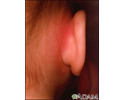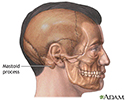Mastoiditis
Mastoiditis is an infection of the mastoid bone of the skull. The mastoid bone is located just behind the ear.
Mastoiditis is most often caused by a middle ear infection (acute otitis media). The infection may spread from the ear to the mastoid bone. The bone has a honeycomb-like structure that fills with infected material and may break down.
The condition is most common in children. Before antibiotics, mastoiditis was one of the leading causes of death in children. The condition does not occur very often today. It is also much less dangerous.
Symptoms
Symptoms include:
- Drainage from the ear
- Ear pain or discomfort
- Fever, may be high or suddenly increase
- Headache
- Hearing loss
- Redness of the ear or behind the ear
- Swelling behind the ear, may cause ear to stick out or feel as if it is filled with fluid
Exams and Tests
An exam of the head may reveal signs of mastoiditis. The following tests may show an abnormality of the mastoid bone:
- CT scan of the ear
- Head CT scan
A culture of drainage from the ear may show bacteria.
Treatment
Mastoiditis may be hard to treat because the medicine may not reach deeply into the bone. The condition sometimes requires repeated or long-term treatment. The infection is treated with antibiotic injections, followed by antibiotics taken by mouth.
Surgery to remove part of the bone and drain the mastoid (mastoidectomy) may be needed if antibiotic treatment does not work. Surgery to drain the middle ear through the eardrum (myringotomy) may be needed to treat the middle ear infection.
Outlook (Prognosis)
Mastoiditis can be cured. However, it may be hard to treat and may come back.
Possible Complications
Complications may include:
- Destruction of the mastoid bone
- Dizziness or vertigo
- Epidural abscess
- Facial paralysis
- Meningitis
- Partial or complete hearing loss
- Spread of infection to the brain or throughout the body
When to Contact a Medical Professional
Contact your health care provider if you have symptoms of mastoiditis.
Also call if:
- You have an ear infection that does not respond to treatment or is followed by new symptoms.
- Your symptoms do not respond to treatment.
- You notice any facial asymmetry.
Prevention
Prompt and thorough treatment of ear infections reduces the risk for mastoiditis.
References
Matlock AG, Pfaff JA. Otolaryngology. Matlock AG, In: Walls RM, Hockberger RS, Gausche-Hill M, eds. Rosen's Emergency Medicine: Concepts and Clinical Practice. 10th ed. Philadelphia, PA: Elsevier; 2023:chap 58.
Pelton SI. Otitis externa, otitis media, and mastoiditis. In: Bennett JE, Dolin R, Blaser MJ, eds. Mandell, Douglas, and Bennett's Principles and Practice of Infectious Diseases. 9th ed. Philadelphia, PA: Elsevier; 2020:chap 61.
Mastoiditis - side view of head - illustration
Mastoiditis - side view of head
illustration
Mastoiditis - redness and swelling behind ear - illustration
Mastoiditis - redness and swelling behind ear
illustration
Mastoidectomy - series - Normal anatomy
Presentation
Review Date: 5/30/2022
Reviewed By: Josef Shargorodsky, MD, MPH, Johns Hopkins University School of Medicine, Baltimore, MD. Also reviewed by David C. Dugdale, MD, Medical Director, Brenda Conaway, Editorial Director, and the A.D.A.M. Editorial team.
















